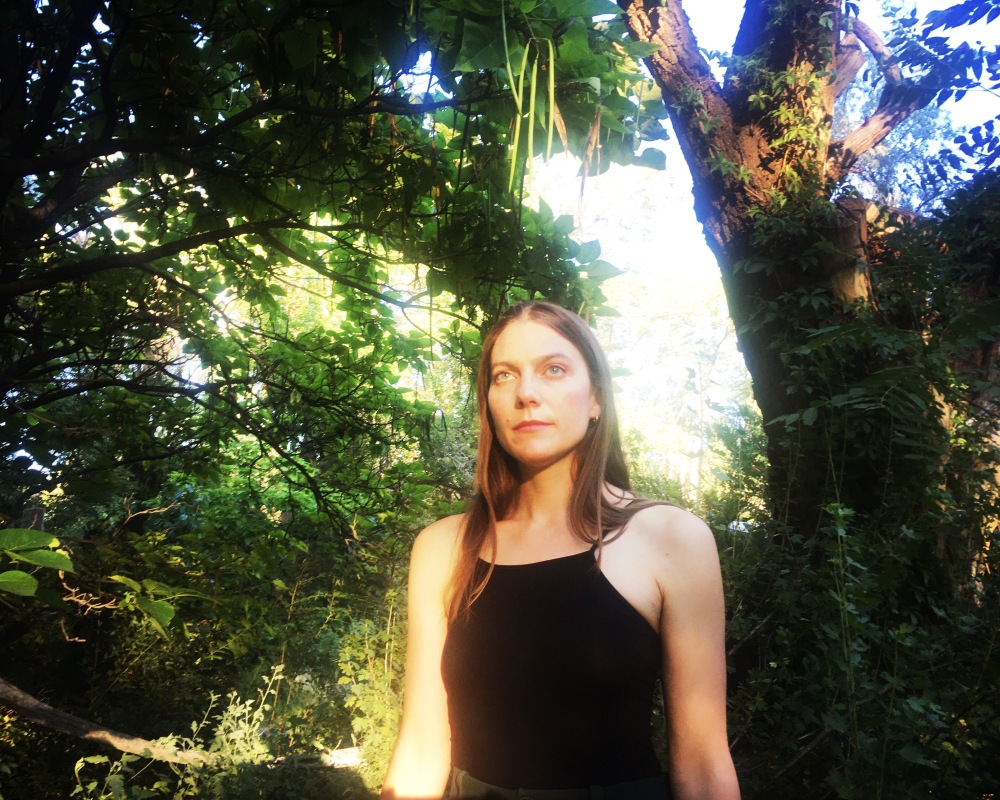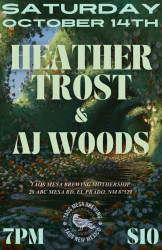Heather Trost & AJ Woods

Heather Trost
As Heather Trost put together her new album Desert Flowers, she imagined herself sitting out on the mesa amidst the arid climate and sand. Even with such little water to survive, wildflowers bloom. This vision is an embellishment of Trost’s Albuquerque surroundings, an intersection of rural splendor and emptiness. She remains focused on those purple, yellow and orange flowers with faces beaming up to the sky, thriving on very little. “How does a flower grow in the desert?” she sings. Desert Flowers postulates the potential for new life. Using the messages from the unconscious during sleep, the record ultimately conceives a bridge to the world beyond our own.
Written and recorded in her home studio, Trost began with harmonic frameworks, allowing the melodies to naturally take root. Introductory track “Frog And Toad Are Friends” - yes, named after the book - is like a surf song from a sci-fi movie. Trost sees it as a mindwipe, “a playful kind of romp to help shake off the cobwebs and get the bones moving.”
The album ripens as it progresses, and “Sandcastles” best embodies the spirit of the record. Lush strings and bass are complimented by a slow guitar groove, as Trost soulfully fantasizes about Earth’s regeneration. “In time, the bullets and tanks, and all of humanity’s violent creations will melt back into mountains and the ocean,” she says.
From there, Trost sharpens her lyrical focus. “The Devil Never Sleeps” is about trusting one’s intuition, and “Blue Fish” (which features prominently in the new Peter Strickland film Flux Gourmet) recounts a dream resembling a cryptic prophecy: “a gray bird appeared to me on a pebble beach. When the bird opened his beak there was a blue fish flopping around and speaking to me.” Continuing the themes of Nature and transcendence, “You Always Gave Me Succor” describes a moving encounter with a coyote which left her feeling watched over, as she witnessed an otherworldly spirit. “Hear you howl deep inside my heart,” she sings. “When my feet can’t bear the concrete/Follow you to the river.” She has often gone back to that memory whenever reaching a crossroads in life.
“Your Favorite Color” is about the metaphysical bond between loved ones, even after death. Trost cites a few dream visits from kith and kin, and the intense mixture of love, loss, and comfort that washed over her in those moments of resurrection. Each song conveys how opening ones eyes, both literally and metaphysically, is the key to finding beauty.
Integral to the record’s creation was Trost’s cohort in A Hawk & A Hacksaw and record label Living Music Duplication, Jeremy Barnes. “This album wouldn’t sound the way it does without his wonderfully discerning and courageous ear,” she says. Much like her previous two albums, Agistri and Petrichor, the record was primarily recorded at their home studio.
Many of the tracks on Desert Flowers were created during difficult years, during which Trost’s strident creativity offered a much-needed path to solace. “Maybe these songs are a bit like desert flowers,” she reflects, “pushing their way towards the sun, and in turn searching and pushing roots deep into the ground for water. As above, so below, the light and the dark, extroverted and introverted, color and monochrome.”
—------
Notes / Ramblings / Drafting Materials:
The brush-heavy drums and lonely piano on the last track of Side A, Black is the Night, form Trost’s very own lament . Reminiscent of the last scene of Jarmusch’s Dead Man, Trost sings, “Black is the night, the rising tide comforts me. Guardian angels guide me home, guide me home” as her voice fades into the dark.
Trost cites husband Jeremy Barnes (previously the drummer for Neutral Milk Hotel) as an integral part of the record’s creation. Serving as a source of support, he helped to mold the album with his “wonderfully discerning and courageous ear” she says.
The collection of contemporary lullabies transforms the traditions of European
avant-pop, psychedelia, and trip-hop into a soundscape of Trost’s own. Fuzzy melodies
bloom over layered synthesizers as Trost’s enchanting vocals promise, “It’s no one’s
fault.”
On some tracks, Trost’s vocals lose shape and form, morphing into a wordless instrument that fills the shadows of her haunting (diff word here idk) orchestra. On others, she briefly leaves her sonic underworld and dips her toes into the known. On the last track on Side A, brush-heavy drums and a simplistic piano accompany Trost’s very own contemporary jazz standard. “Black is the night and bright are the stars that guide my way,” she sings as her voice fades into the dark.
Before her endeavor into solo musicianship, Trost played violin in Beirut alongside
husband Jeremy Barnes (previously the drummer for Neutral Milk Hotel). Currently, the
two collaborate in their band, A Hawk and a Hacksaw.. The two run the Living Music
Duplication label in Albuquerque where they also work as music teachers, urban
gardeners, and career musicians.
As a solo artist, Trost has authored two previous records ‘Petrichor’ and ‘Agistri,’ both
receiving critical acclaim from publications such as Pitchfork, Aquarium Drunkard, and
the New Yorker.
The latter half of the album grows more abstract and twisted than its former, drawing from funk, and including surrealist lyrics like ‘from your mouth grew an oak tree.’ ... pulsating just above or just below the New Mexico sand.


